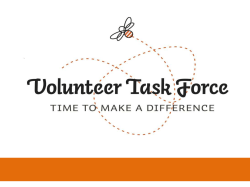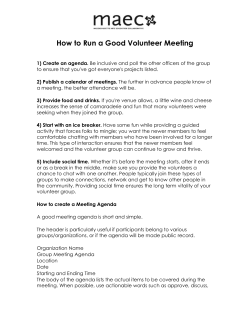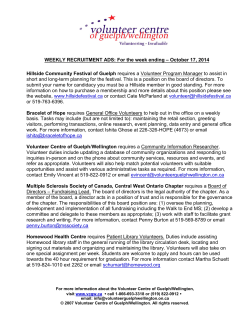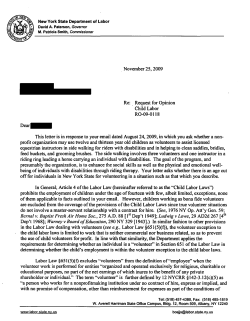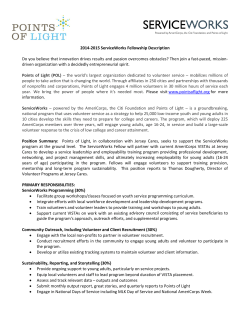
2015 Portland metro area Master Gardener program proposal
2015 Portland metro area Master Gardener program proposal Executive summary The OSU Extension Service Master Gardener™ program team for Clackamas, Multnomah, and Washington Counties (Weston Miller, Pukhraj Deol, Jordis Yost and Margaret Bayne) propose to make a set of systematic changes to the MG training and volunteer program for 2015, which are based on rich feedback from a recent strategic planning process and on seven years of survey evaluation. There are multiple goals for these proposed changes including: 1. Improve the effectiveness of the MG training and volunteer program. 2. Streamline branding and communications. 3. Optimize resources (financial, human, and organizational). 4. Expand our reach to under-‐served audiences to promote diversity and equity. 5. Grow the next generation of gardeners (youth and adults). Proposed format changes to MG training We propose the following educational programming for the 2015 MG training: • Reduce lecture format of MG training from 11 weeks to 7 weeks. • Provide access for new and existing MG volunteers to online MG modules through OSU Continuing and Professional Education and require new trainees to complete a set of four modules and have access to 10 additional modules to enjoy at their leisure. • Provide a series of workshops as part of MG training and require new trainees to participate in one full-‐day workshop through the course of the season. Some slots in the workshops would also be open to existing MG volunteers for FREE and to the general public for $50. • Require new trainees to attend at least three gardening seminars at MG chapter meetings or other venues as part of the MG training curriculum. • Require new trainees to pass an exam before participating in MG clinic volunteer activities. • Reduce recertification education requirement of existing MG volunteers to 10 hours. Proposed changes to MG volunteer program We suggest that new trainees participate in volunteer activities as follows (56 hours minimum): OSU Sponsored activities: 12 hours phone clinics, 12 hours remote clinics, or substitute hours for support of Garden educators’ guild and receive mentoring from experienced presenters. Partner-‐sponsored activities: MG chapters-‐ 3 hours plant sales, 10 hours demo gardens, 3 hours chapter support; Public gardens 10 hours; other partners 6 hours. We suggest that existing MGs participate in volunteer activities as follows (20 hours minimum): OSU Sponsored activities: 6 hours phone clinics, 6 hours remote clinics or substitute hours instructing or for support for Garden educators’ guild. Partner-‐sponsored activities: MG chapters-‐ 3 hours plant sales, 3 hours demo gardens, 3 hours chapter support; Public gardens 3 hours. Cooperation and mutual support We would like to work closely with Master Gardener chapters and volunteers to retool our educational enterprise for 2015 and beyond through cooperation and mutual support! Read on to learn more about our proposed changes to the metro area MG program. MG training proposal-‐ August 2014 1 2015 Portland metro area Master Gardener program proposal A. Overall proposal Focus of OSU Master Gardener Program As recommended by the statewide Master Gardener program, we focus the MG training on Sustainable Gardening and Local and Backyard Food Production. 2015 Master Gardener Training requirements and options (56+ hours instruction) Program element Requirements Notes MG Core Training 42 hours; 14 classes Tuesdays February 3 – March 17 in Beaverton. covered in 7 Thursdays February 5 – March 19 in Oregon City. consecutive weeks Saturdays February 7 – March 21 in NE Portland. Online modules 6 hours; Take four required modules and enjoy access to nine though Blackboard 4 modules required additional research-‐based modules at your convenience. Hands-‐on workshops 5 hours; 1 workshop Sign up for one workshop and report. Gardening seminars 3 hours; 3 seminars Attend as many as you like and report. Final exam Online; paper-‐based * We provide online and in-‐person tutoring sessions. Recertification 10 hours Choose from above + annual Fall recertification seminar. *Propose two three-‐hour sessions per month for MG-‐led tutoring session. Provide computer for research and access to online modules. Book conference rooms on monthly dates at the three MG phone offices. Create monthly shift for two to three MG mentors to help build confidence in of new trainees and existing volunteers in using the MG training materials and other research-‐based information resources to diagnose problems and provide management options/recommendations for garden, landscape and household pest questions. MG Interest group is also promoted as an advanced MG diagnostician mentoring session. Consider establishing a formal “MG mentoring program.” B. Master Gardener Core Training The Master Gardener Core Training is an introduction to the MG program and is required to become a certified OSU Extension Service Master Gardener volunteer. The focus of the Core Training is on critical content and details to support you in being an OSU volunteer. The MG Core Training is conducted in an interactive, lecture-‐style format from 9am-‐4pm at three convenient locations in the metro area as follows: MG Core Training includes the following topics: Week Dates Time Topic Week 1 Feb. 3, 5, 7 9am-‐12pm MG program overview; Get to know you 1pm-‐4pm Soils and fertilizers Week 2 Feb. 10, 12, 14 9am-‐12pm Vegetable gardening in the Willamette Valley 1pm-‐4pm Vegetation management for urban and rural settings Week 3 Feb. 17, 19, 21 9am-‐12pm Entomology 1pm-‐4pm Fruit and berry crops in the Willamette Valley MG training proposal-‐ August 2014 2 2015 Portland metro area Master Gardener program proposal Week 4 Feb. 24, 26, 28 9am-‐12pm Understanding pesticides 1pm-‐4pm Care for woody ornamental landscape plants and lawns Week 5 Mar. 3, 5, 7 9am-‐12pm Vertebrate pests 1pm-‐4pm Integrated Pest Management Week 6* Mar. 10, 12, 14 9am-‐12pm Volunteer orientation: How to be an MG 1pm-‐4pm Resource fair, networking, and potluck Week 7 March 17, 19, 21 9am-‐12pm Plant problem diagnosis theory 1pm-‐4pm Plant problem diagnosis practice Saturday, 8:30am-‐ Celebrate your success! Graduation, Harvest Party, November 7 3:30pm Recertification Attendance policy: Please plan to attend all of the sessions listed above. You can attend sessions at a different location/day of week to provide some flexibility in terms of attendance. Training locations for 2015 Day of week Dates Location Address Tuesdays February 3 – First Baptist Church 5755 SW Erickson Ave. March 17 Beaverton, OR 97005 Thursdays February 5 – Museum of the Oregon 211 Tumwater Dr. March 19 Territory Oregon City, OR 97045 Saturdays February 7 – Metro Regional Center 600 NE Grand Ave. March 21 Portland, OR 97232 C. Online modules through Blackboard We provide all Master Gardener trainees and existing volunteers with access to OSU’s Master Gardener Online Short Course Series and other modules through Blackboard to take both required and optional online classes on a range of horticulture topics. REQUIRED modules include: 1. Basic Botany: Learn to identify a diverse range of whole plants, parts of plants, and non-‐ plant relatives (such as fungus, lichen, algae, moss, fern, conifer and seed plants) 2. Plant Pathology: Identify microorganisms that cause plant disease and symptoms; learn how to diagnose and control plant disease 3. Cultural Causes of Plant Problems: What causes cultural plant problems? Neil Bell covers common culture threats to plants in this online course focusing on planting practices, the risks of root bound plants, misusing mulch, root damage, pruning and injuring plants with the improper application of herbicides. 4. Environmental Causes of Plant Problems: Happy environment, happy plants Investigate how environmental causes impact the health of your plant, including cold injury, pollination problems, sun (too much or too little), weather elements or air pollution. MG training proposal-‐ August 2014 3 2015 Portland metro area Master Gardener program proposal OPTIONAL: All of the other modules listed below are available for you to view at your leisure during the 2015 MG training season. Enjoy! 1. Soils and Compost: Understand the impact of soil texture and composition on soil quality, pH levels, and soil nutrients; learn about fertilizer types and application techniques; learn how to produce compost 2. Vegetable Gardening: Learn how to select a site, prepare soil and plant vegetables properly; gain skills to successfully produce food; learn to identify common insect and disease problems 3. Introduction to Entomology: Study the biology, anatomy, life cycles, and differences between insects and non-‐insect arthropods; learn how to diagnose problems 4. Understanding Pesticides: Understand how to read and interpret pesticide labels; learn how to safely mix, apply, handle, and dispose of pesticides 5. Integrated Pest Management: Understand theory, principles, and practices behind pest management, with emphasis on least-‐hazardous approaches 6. Woody Landscape Plants: Learn how to select, plant, manage, and prune trees and shrubs, with site and environmental factors in mind 7. A Systematic Approach to Plant Problem Diagnosis: How does the systematic process aid in curing plant pests and disease? Learn to form the right questions to systematically narrow the possible cause and effects of under performing plants and gardens. Instructor Neil Bell walks plant enthusiasts through the steps necessary to make an accurate diagnosis to cultivate a thriving plant and flora environment. 8. Introduction to Plant Problem Diagnosis: What are the benefits of correct plant problem diagnosis? Are you a home gardener, commercial landscaper or sower of agricultural crops? Learn how all three trades systematically approach plant problems in a similar manner. Learn to gather information from clients, discuss plant growth and identification. Clearly assessing a plant problem leads to taking actions to resolve the issue. Save time and money by not treating problems you don't have. 9. Pest Damage: Are you a garden friend or foe? From deer to slugs, there are many threats stopping your garden, landscape or agricultural crop from thriving. Using clues from the systematic approach to plant problems, identify the probable culprits of your plant woes and learn how to correct or recommend solutions. D. Hands-‐on workshops (Conducted 10am – 3:30pm; 5 hours instructional time per workshop) We offer a range of hands-‐on workshops on a variety of topics for you to build your skill set as a gardener and as a horticulture educator in the community. REQUIRED: Choose one workshop as part of your 55 hours of training. You can take additional workshops if there is space available. Many of our workshops are also open to the general public for $50 per class and for free for existing OSU MG volunteers (that are current with OSU recertification requirements and paperwork) on a space-‐available basis. MG training proposal-‐ August 2014 4 2015 Portland metro area Master Gardener program proposal See “Workshop proposal” document for details. We hope to work with the MG chapters and volunteers at-‐large to help coordinate and host the workshop series. E. Gardening seminars at MG chapter meetings and other events Our local Master Gardener volunteer groups (known as chapters) in Clackamas, Multnomah, and Washington counties provide monthly educational seminars on a wide range of topics. Selected seminars listed below can be applied toward your MG program training requirements. Attend any three or more seminars and report before October 1, 2014. Please note: these events are FREE of charge and open to the public. Bring your friends and family! See a schedule of 2015 seminars below<<link to schedule TBD>>: For 2015, we invite the Clackamas, Multnomah, and Washington MG chapters to include at least three one-‐hour gardening seminars at chapter meetings and/or other events with topics/instructors pre-‐approved by the MG program staff. New trainees will be required to attend at least three seminars as part of their educational requirements. For these specified events, MG program staff would like to attend to help provide a connection to the overall MG training and to enjoy good company. Weston Miller is available to instruct for one event per county on any topic of interest. F. Final exam Successful completion of an exam is required to become a certified MG volunteer. The goal of the exam is to ensure that trainees meet learning objectives of the MG program. The exam is available online or paper-‐based and you must complete the final exam and 55 hours of volunteer internship in order to get an official OSU Master Gardener name badge and to be eligible to continue to volunteer in our program in subsequent years. You must pass exam with at least 80% by March 30, 2015 in order to participate in the OSU sponsored volunteer activities described below. Please note: We offer online and in-‐person study sessions to help you prepare for this exam! Also, we allow multiple attempts at the exam to ensure that you pass! G. Learning Objectives As a season-‐long and multi-‐faceted educational program, the Master Gardener training hopes to provide students with information, instruction, and resources need to acquire the following knowledge and skills: • Increased understanding the OSU Extension Service Master Gardener program including roles and responsibilities of MG volunteers, MG program staff, and MG chapters. • Ability to use online resources including Blackboard for learning and CERVIS for scheduling to participate in the MG training and volunteer program. • Ability to perform research using OSU resources including Sustainable Gardening, Pacific Northwest Insect, Disease, and Weed Management Handbooks and other sources of MG training proposal-‐ August 2014 5 2015 Portland metro area Master Gardener program proposal • • • • • • • • research-‐based information to diagnose plant problems and provide management recommendations. Ability to promote science-‐based horticulture and pest management information to the general public and community-‐based gardening projects (school and community). Understand the principals and decision making process of Integrated Pest Management (IPM) for guiding pest management recommendations to the public. Competency to communicate the relative benefits and risks of no action, cultural/physical, biological, and chemical management strategies. Help residents select effective pest management strategies that pose the lowest risks to human health, non-‐target organisms, habitats and water quality. Increased understanding the general growing conditions for major plant types including vegetables, trees and shrubs, perennials, annuals, turf grass, and containers. Refer questions from the public to the appropriate OSU or partner agency public services. Ability to perform hands-‐on skills in sustainable gardening and plant problem diagnosis at classes, workshops, and demonstration gardens. Create community by learning about gardening and serving the community with other gardening enthusiasts! H. Business plan The estimated income and expense to operate the Master Gardener training according to this proposed plan are detailed below in terms of secure income, unsecure income, projected fixed costs, and projected variable costs. As part of this plan, we propose raising tuition from $395 to $495 and to provide 55 slots at half-‐price as part of a regional tuition reduction effort conducted jointly by the MG program office, MG chapters, and other interested volunteers. Also, as part of this plan, we have a fundraising goal of $20,000 expressed as unsecured income for which we hope to generate funds from MG chapters, individuals, businesses, and other fundraising mechanisms. Of the $20,000 in funds needed, we suggest contributions go toward the following items/amounts: • Scholarships $7,500; • Facilities and hospitality $5,175 • Branding and communications $5,000 • MG program operations $2,325 See “Budget proposal” document more information. I. Branding and communications The recent strategic planning process calls for an audit of existing Master Gardener websites, newsletters, and communications strategies. We have hired Turtle Dove Clemens advertising and marketing agency to help with this effort and to provide guidance on how we can simplify MG training proposal-‐ August 2014 6 2015 Portland metro area Master Gardener program proposal our existing communications efforts to create a consistent brand identity among the MG program office, MG chapters, and at-‐large activities so that we know who we are collectively and how we want to convey our image to the general public. We also hope to create updated marketing materials including website and newsletter templates, flyers, and more. J. Focus for 2015 and beyond We envision that the programming changes detailed above will provide us with a good start to re-‐tool the Master Gardener program for the future. We also hope to build on the successful implementation of this operations plan to advance the Master Gardener strategic plan. Specifically, we hope to work with any interested Master Gardener volunteers and community partners to enhance training options in preparation for the 2016 MG training in terms of online content, hands-‐on workshops, and gardening seminars by working with MG chapters and interested volunteers to further develop educational programing that provides research-‐based education to the community as follows: • Perform and equity/diversity audit of MG training and outreach efforts and create plans and operations to address the needs of all communities of people in the Portland metro region. • Develop a formal mentoring program to build community and provide networking and learning opportunities among existing and new MG volunteers. • Further refine branding and communications efforts. • Develop trainings, volunteer support system, and outreach mechanisms to develop a regional troupe of volunteers that deliver gardening seminars and workshops on specified topics to the community. • Develop trainings, volunteer support systems, outreach mechanisms, and quality control for diagnosing plant problems and communicating management options to the general public. • Develop other workshop and seminar offerings for MG training and recertification and for general public based on relevant topics for the gardening public. MG training proposal-‐ August 2014 7
© Copyright 2025




